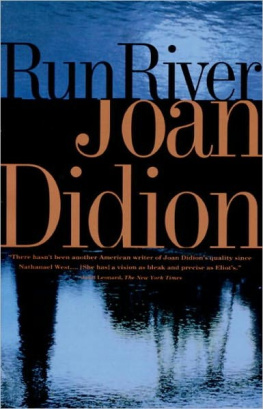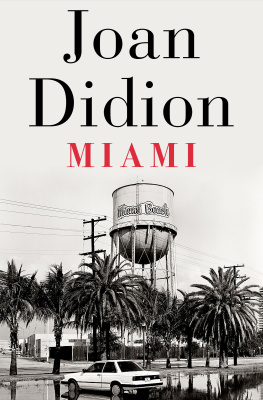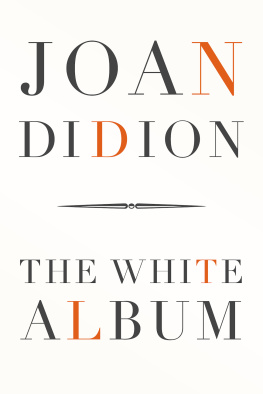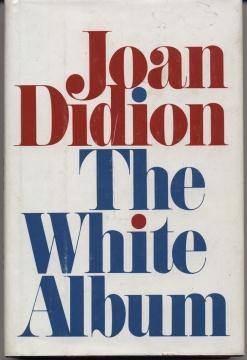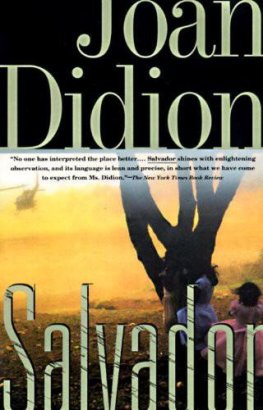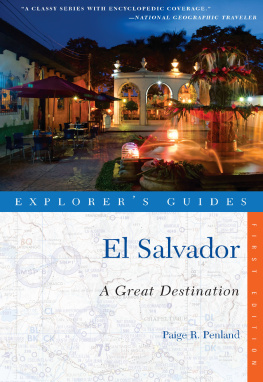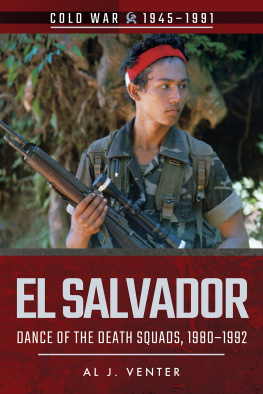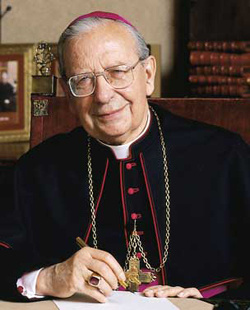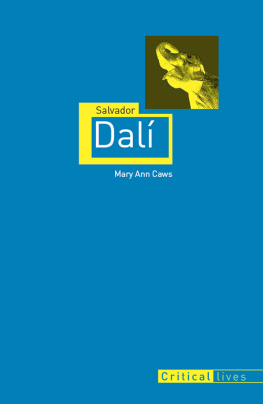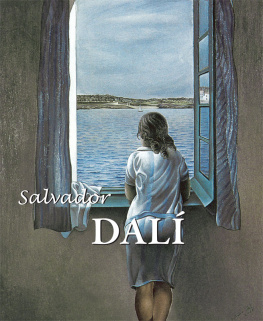Didion - Salvador
Here you can read online Didion - Salvador full text of the book (entire story) in english for free. Download pdf and epub, get meaning, cover and reviews about this ebook. City: New York;El Salvador, year: 2011;1994, publisher: Knopf Doubleday Publishing Group;Vintage International, genre: Detective and thriller. Description of the work, (preface) as well as reviews are available. Best literature library LitArk.com created for fans of good reading and offers a wide selection of genres:
Romance novel
Science fiction
Adventure
Detective
Science
History
Home and family
Prose
Art
Politics
Computer
Non-fiction
Religion
Business
Children
Humor
Choose a favorite category and find really read worthwhile books. Enjoy immersion in the world of imagination, feel the emotions of the characters or learn something new for yourself, make an fascinating discovery.

- Book:Salvador
- Author:
- Publisher:Knopf Doubleday Publishing Group;Vintage International
- Genre:
- Year:2011;1994
- City:New York;El Salvador
- Rating:3 / 5
- Favourites:Add to favourites
- Your mark:
- 60
- 1
- 2
- 3
- 4
- 5
Salvador: summary, description and annotation
We offer to read an annotation, description, summary or preface (depends on what the author of the book "Salvador" wrote himself). If you haven't found the necessary information about the book — write in the comments, we will try to find it.
Salvador — read online for free the complete book (whole text) full work
Below is the text of the book, divided by pages. System saving the place of the last page read, allows you to conveniently read the book "Salvador" online for free, without having to search again every time where you left off. Put a bookmark, and you can go to the page where you finished reading at any time.
Font size:
Interval:
Bookmark:
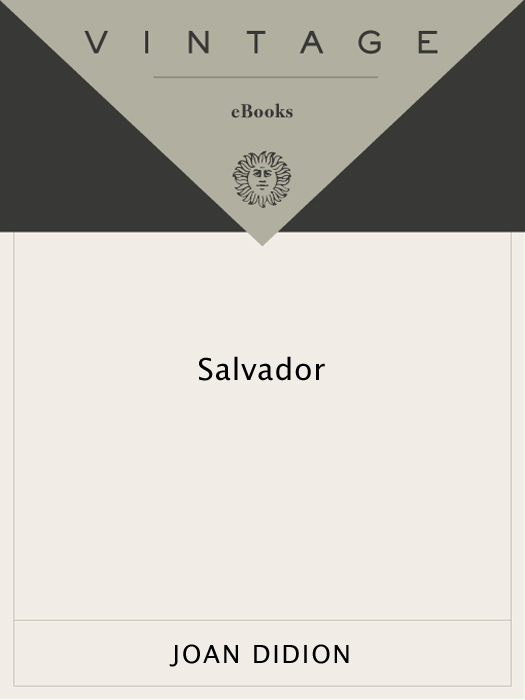
Joan Didion was born in California and lives in New York City. She is the author of five novels and seven previous books of nonfiction, including The Year of Magical Thinking. Her collected nonfiction, We Tell Ourselves Stories in Order to Live, was published by Everymans Library in September 2006.
W E T ELL O URSELVES S TORIES IN O RDER TO L IVE
T HE Y EAR OF M AGICAL T HINKING
W HERE I W AS F ROM
P OLITICAL F ICTIONS
T HE L AST T HING H E W ANTED
A FTER H ENRY
M IAMI
D EMOCRACY
S ALVADOR
T HE W HITE A LBUM
A B OOK OF C OMMON P RAYER
P LAY I T AS I T L AYS
S LOUCHING T OWARDS B ETHLEHEM
R UN R IVER
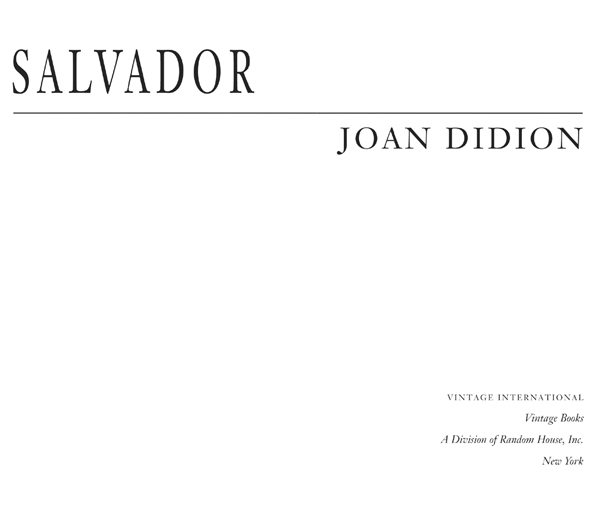

FIRST VINTAGE INTERNATIONAL EDITION, MAY 1994
Copyright 1983 by Joan Didion
All rights reserved under International and Pan-American Copyright Conventions. Published in the United States by Vintage Books, a division of Random House, Inc., New York, and simultaneously in Canada by Random House of Canada Limited, Toronto. Originally published in hardcover by Simon and Schuster, New York, in 1983.
Portions of this book were published in The New York Review of Books in 1982.
The author wishes to thank the following for their permission to reprint lines from:
The song American Pie, written by Don McLean, published by Mayday Music and Benny Bird Company, 1971. Used by permission. All rights reserved.
The specified abridged excerpt from pp. 63-64 in The Autumn of the Patriarch by Gabriel Garca Mrquez. Translated from the Spanish by Gregory Rabassa. Copyright 1975 by Gabriel Garca Mrquez. English translation copyright 1976 by Harper & Row, Publishers, Inc. Reprinted by permission of the publisher.
The excerpt from Heart of Darkness from Youth by Joseph Conrad. Reprinted by permission of Doubleday & Company, Inc.
The lines from the poem by Roque Dalton Garca from the book El Salvador:
The Face of the Revolution by Robert Armstrong and Janet Shenk.
Copyright 1982, South End Press. Reprinted by permission of the publisher.
Library of Congress Cataloging-in-Publication Data
Didion, Joan
Salvador / Joan Didion.
p. cm
Originally published: New York: Simon and Schuster, 1983.
eISBN: 978-0-307-78736-1
1. El SalvadorPolitics and government1979 2. Civil rightsEl Salvador. 3. TerrorismEl Salvador. 4. Human rightsEl Salvador. 5. Didion, JoanJourneysEl Salvador. I. Title.
F1488.3.D53 1994
972.84052dc20 93-42217
Author photograph Quintana Roo Dunne
v3.1
I am indebted for general background particularly to Thomas P. Andersons Matanza: El Salvadors Communist Revolt of 1932 (University of Nebraska Press: Lincoln, 1971) and The War of the Dispossessed: Honduras and El Salvador, 1969 (University of Nebraska Press: Lincoln, 1981); to David Brownings El Salvador: Landscape and Society (Clarendon Press: Oxford, 1971); and to the officers and staff of the United States embassy in San Salvador. I am indebted most of all to my husband, John Gregory Dunne, who was with me in El Salvador and whose notes on, memories about, and interpretations of events there enlarged and informed my own perception of the place.
This book is for
Robert Silvers
and for
Christopher Dickey
All Europe contributed to the making of Kurtz; and by-and-by I learned that, most appropriately, the International Society for the Suppression of Savage Customs had intrusted him with the making of a report, for its future guidance. And he had written it, too. Ive seen it. Ive read it. It was eloquent, vibrating with eloquence. By the simple exercise of our will we can exert a power for good practically unbounded, etc. etc. From that point he soared and took me with him. The peroration was magnificent, although difficult to remember, you know. It gave me the notion of an exotic Immensity ruled by an august Benevolence. It made me tingle with enthusiasm. This was the unbounded power of eloquenceof wordsof burning noble words. There were no practical hints to interrupt the magic current of phrases, unless a kind of note at the foot of the last page, scrawled evidently much later, in an unsteady hand, may be regarded as the exposition of a method. It was very simple, and at the end of that moving appeal to every altruistic sentiment it blazed at you, luminous and terrifying, like a flash of lightning in a serene sky: Exterminate all the brutes!
Joseph Conrad,
Heart of Darkness
T HE three-year-old El Salvador International Airport is glassy and white and splendidly isolated, conceived during the waning of the Molina National Transformation as convenient less to the capital (San Salvador is forty miles away, until recently a drive of several hours) than to a central hallucination of the Molina and Romero regimes, the projected beach resorts, the Hyatt, the Pacific Paradise, tennis, golf, water-skiing, condos, Costa del Sol; the visionary invention of a tourist industry in yet another republic where the leading natural cause of death is gastrointestinal infection. In the general absence of tourists these hotels have since been abandoned, ghost resorts on the empty Pacific beaches, and to land at this airport built to service them is to plunge directly into a state in which no ground is solid, no depth of field reliable, no perception so definite that it might not dissolve into its reverse.
The only logic is that of acquiescence. Immigration is negotiated in a thicket of automatic weapons, but by whose authority the weapons are brandished (Army or National Guard or National Police or Customs Police or Treasury Police or one of a continuing proliferation of other shadowy and overlapping forces) is a blurred point. Eye contact is avoided. Documents are scrutinized upside down. Once clear of the airport, on the new highway that slices through green hills rendered phosphorescent by the cloud cover of the tropical rainy season, one sees mainly underfed cattle and mongrel dogs and armored vehicles, vans and trucks and Cherokee Chiefs fitted with reinforced steel and bulletproof Plexiglas an inch thick. Such vehicles are a fixed feature of local life, and are popularly associated with disappearance and death. There was the Cherokee Chief seen following the Dutch television crew killed in Chalatenango province in March of 1982. There was the red Toyota three-quarter-ton pickup sighted near the van driven by the four American Catholic workers on the night they were killed in 1980. There were, in the late spring and summer of 1982, the three Toyota panel trucks, one yellow, one blue, and one green, none bearing plates, reported present at each of the mass detentions (a detention is another fixed feature of local life, and often precedes a disappearance) in the Amatepec district of San Salvador. These are the detailsthe models and colors of armored vehicles, the makes and calibers of weapons, the particular methods of dismemberment and decapitation used in particular instanceson which the visitor to Salvador learns immediately to concentrate, to the exclusion of past or future concerns, as in a prolonged amnesiac fugue.
Terror is the given of the place. Black-and-white police cars cruise in pairs, each with the barrel of a rifle extruding from an open window. Roadblocks materialize at random, soldiers fanning out from trucks and taking positions, fingers always on triggers, safeties clicking on and off. Aim is taken as if to pass the time. Every morning
Font size:
Interval:
Bookmark:
Similar books «Salvador»
Look at similar books to Salvador. We have selected literature similar in name and meaning in the hope of providing readers with more options to find new, interesting, not yet read works.
Discussion, reviews of the book Salvador and just readers' own opinions. Leave your comments, write what you think about the work, its meaning or the main characters. Specify what exactly you liked and what you didn't like, and why you think so.

